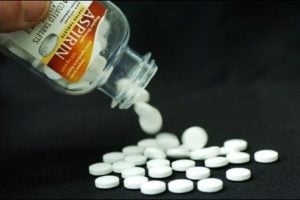aspirin
Researchers find regular use of aspirin may lower risk of adult leukemia
Researchers from the Cancer Center at the University of Minnesota have found that adult women taking aspirin two or more times a week may lower their risk of adult leukemia by more than 50 percent. The study will be published in the June 13 edition of Cancer Epidemiology, Biomarkers & Prevention, a journal of the American Association for Cancer Research.
Ibuprofen, aspirin may offer protection against Alzheimer's disease
Researchers have found evidence that non-steroidal anti-inflammatory drugs (NSAIDs) including ibuprofen, aspirin, and naproxen, may exert a protective effect against the risk of Alzheimer’s disease. Results of their epidemiological, multiple-study analysis of nearly 16,000 patients are being presented at the American Academy of Neurology Annual Meeting in Honolulu, March 29-April 5, 2003.
An Aspirin a Day Keeps the Colorectal Polyps Away
A national study indicates that patients who have had previous colorectal cancer and take 325 milligrams of aspirin each day — the equivalent of one adult aspirin — may lower the risk of developing new colon polyps by 35 percent. Polyps appear to be precursors to most colorectal cancers. The double-blind study randomly assigned half of the 635 patients who previously had colorectal cancer to an aspirin treatment group. The other half received a placebo or sugar pill. The results of the study will be published in the March 6, 2003, issue of the New England Journal of Medicine.
Baby and coated aspirin may not reduce risk of stroke
The majority of patients who take baby or coated aspirin to prevent strokes are not getting the blood-thinning results they may need to help avoid these health threats, according to preliminary research presented today at the American Stroke Association’s 28th International Stroke Conference. The American Stroke Association is a division of the American Heart Association. “While research has established that aspirin reduces the risk of stroke in patients with cerebrovascular disease, the optimal dose and formulation still remains somewhat unclear,” according to Mark Alberts, M.D., the study’s lead author and director of the Stroke Program at Northwestern Memorial Hospital. “This study is significant in that it points researchers in the right direction ? showing how we can maximize the effectiveness of aspirin.”


